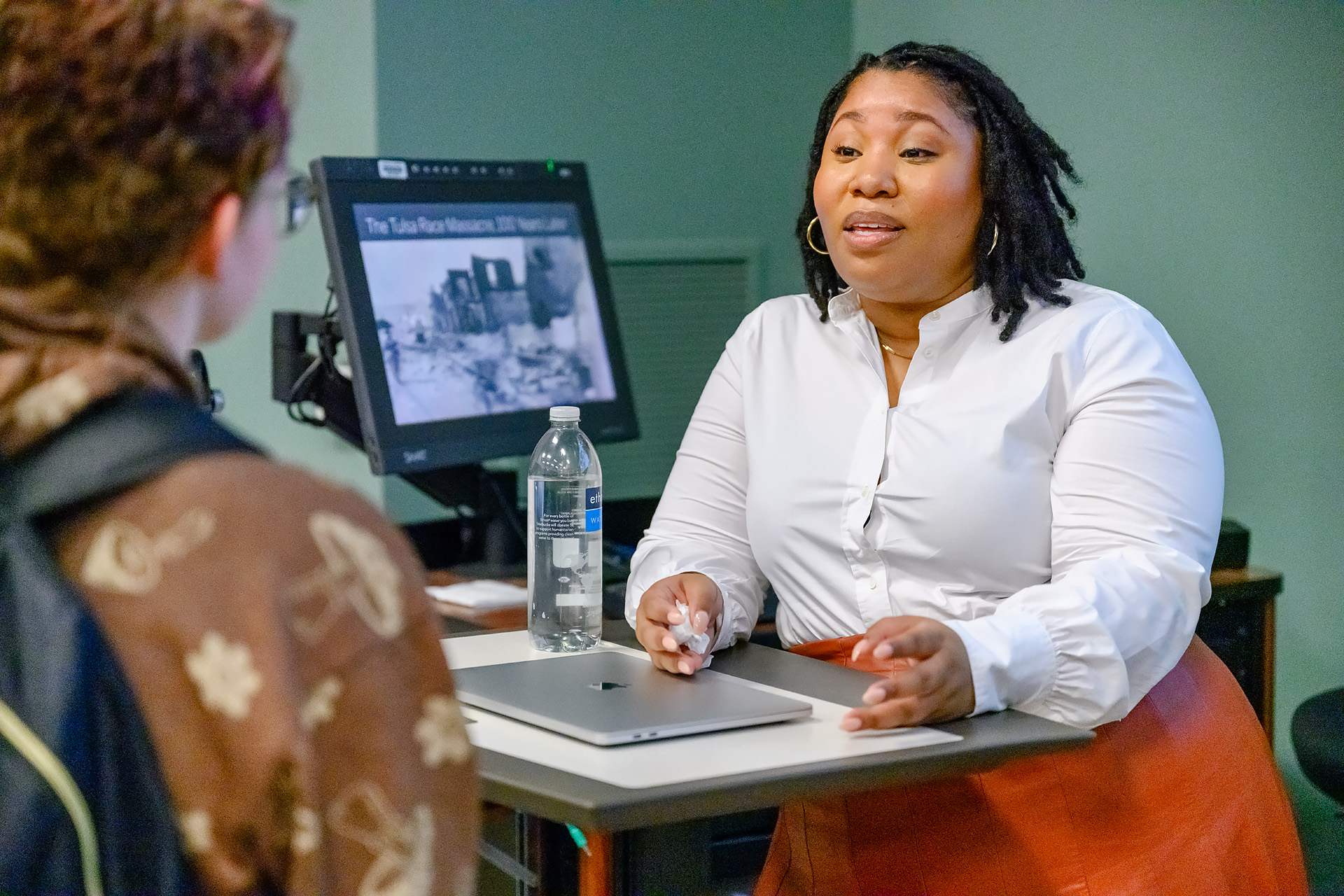Programs and Events
(Sponsored and co-sponsored by the Seigenthaler Chair of Excellence)
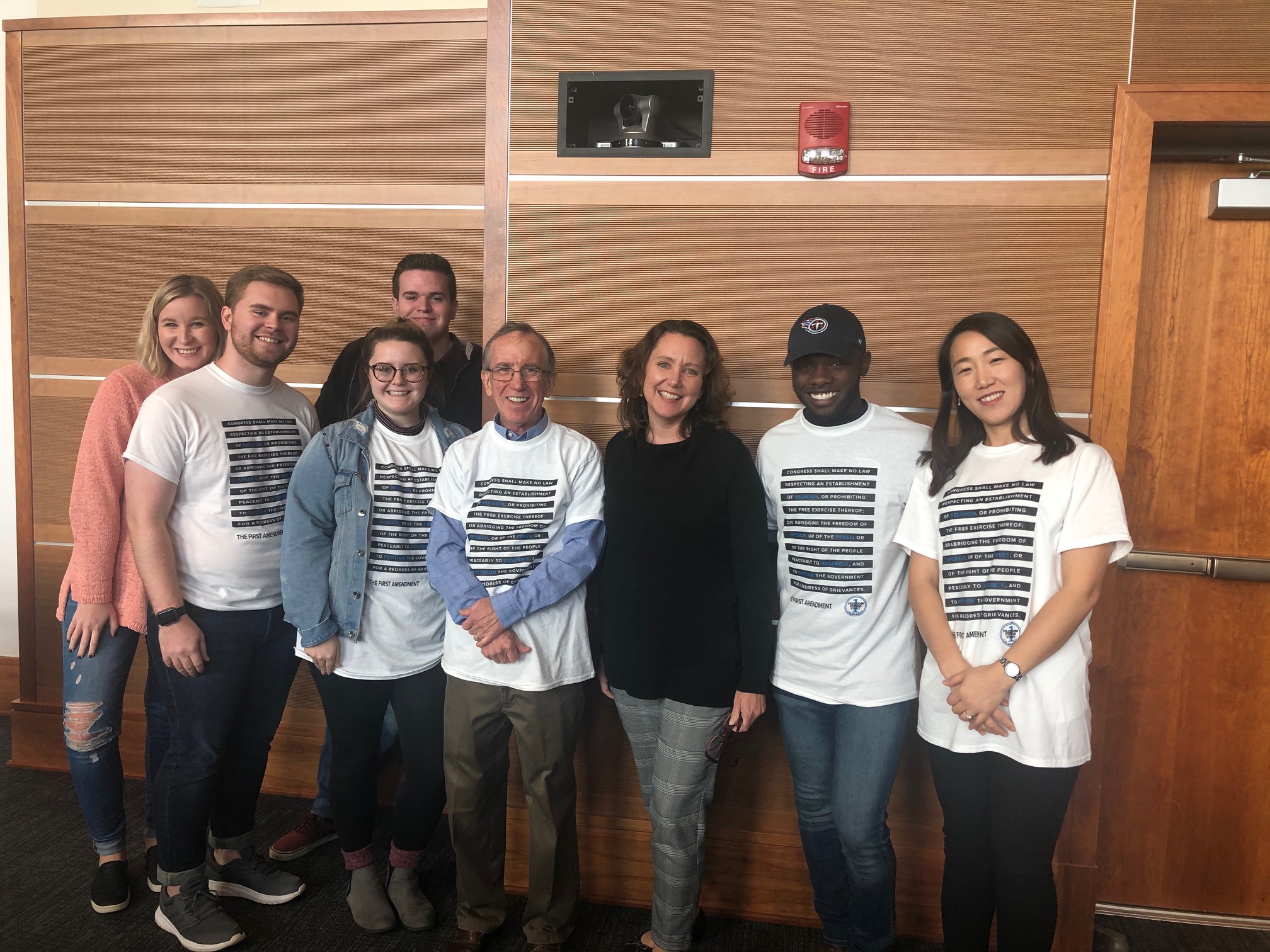
2023 events
Anna Wolfe of Mississippi Today: Anna Wolfe in the investigative reporter on poverty for Mississippi Today, a nonprofit news organization founded in 2016 focused on watchdog journalism related to Mississippi's state and local government, economy, environment, public schools and universities, and criminal justice system. In 2023, Wolfe won the 2023 Pulitzer Prize in Local Reporting for her work revealing how a former Mississippi governor used his office to steer millions of state welfare dollars to benefit his family and friends, including NFL quarterback Brett Favre. She spoke with students about her work and her career. She also talked with Free Speech Center Director Ken Paulson about the project.
2022 events
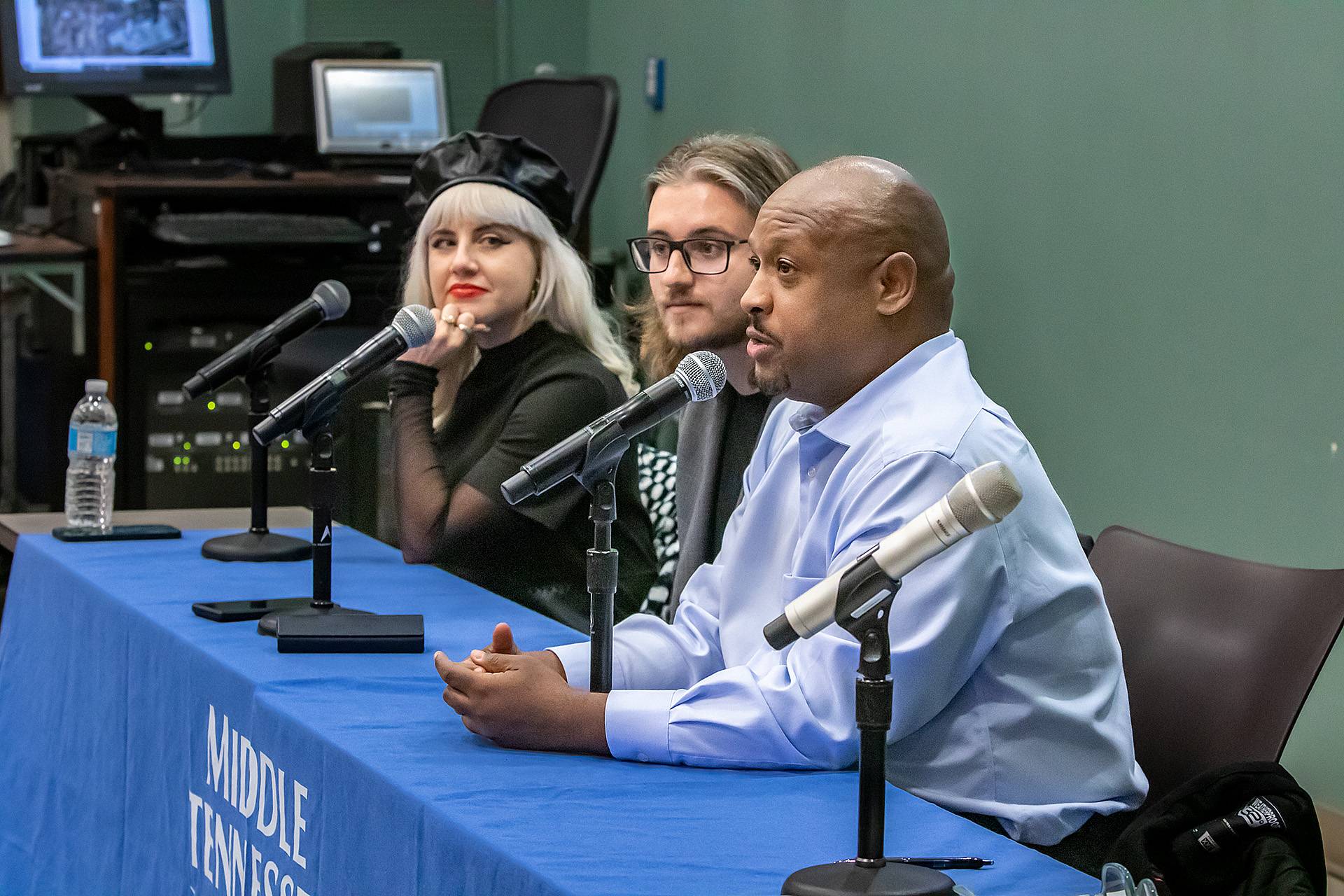
Winners of 2022 Pulitzer Prize in Investigative Reporting: Three journalists with the Tampa Bay Times spoke to students about their Pulitzer-winning work that exposed toxic hazards in and around Florida's only battery recycling plant. Rebecca Woolington, Eli Murray and Corey G. Johnson (left to right in photo) shared with students how the story evolved from asking questions regarding lead in schools to a full-blown expose' of a plant that was out of compliance with safety standards and workers who were dying. Their work, based on government documents and hundreds of interviews, spurred legislative changes and actions by the company. Read more about the project and the effect on worker and public health here.
Charity Scott: Former Wall Street Journal journalist Charity Scott shared with journalism students her work on the award-winning special projecton the Tulsa Race Massacre. In 1921, a mob of white Tulsa residents, some of whom were armed by city officials, attacked Black
residents and burned to the ground 34 blocks of a Black community in Tulsa, Oklahoma, over two days. A commission that studied what was later considered one of the worst instances of racial violence in the United States said the number of people who died ranged from 75 to 300. Scott used news reports from the day to piece together what happened 100 years after the event. The package was a finalist for the 2022 Pulitizer Prize for Explanatory Reporting.
2021 events
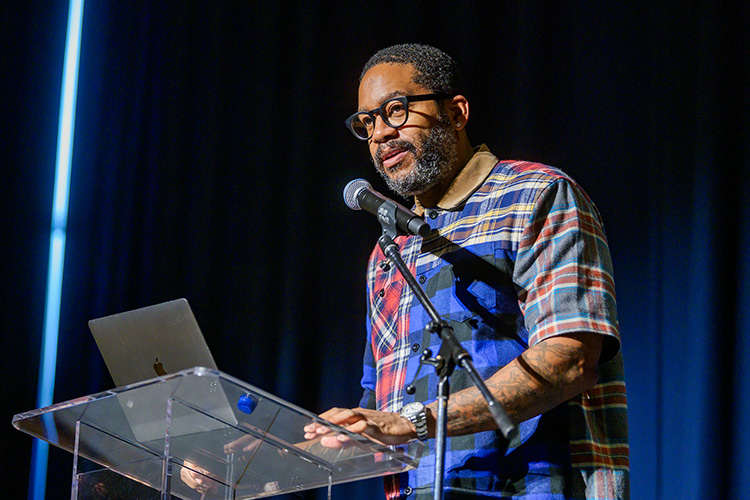
Mitchell Jackson: Acclaimed author and novelist Mitchell Jackson won the 2021 Pulitzer Prize in Feature Writing for his article, "12 Minutes and a Life," chronicling the life and killing of Ahmaud Arbery. He visited MTSU in October 2021 to talk about his work, including his new autobiographical book, "Survival Math: Notes on an All-American Family." The theme of his talk was "Revision" as an element of literary craft and as a metaphor for his own life and the many Black men he grew up with who didn’t have the chance to revise. Jackson's extraordinary story growing up in drug culture included serving time in prison on a drug conviction. When he got out, he earned two master's degrees in writing, one from Portland State University and one from New York University. He also is the author of "The Residue Years" and writes regularly for national magazines, including Esquire and Harper's Bazaar.
2020 events

Wanda Lloyd: Trailblazing journalist Wanda Lloyd, who grew up under Jim Crow segregation laws, became one of the first African-American women to hold a top editor position at a mainstream newspaper when she became executive editor of the Montgomery (Ala.) Advertiser. A leader in promoting diversity in the news industry and accurate news coverage of minority communities, Lloyd discussed her career and recently published memoir, Coming Full Circle: From Jim Crow to Journalism, with a packed room of students during Black History Month on Feb. 10, 2020. See story about the event, Veteran black journalist Lloyd urges MTSU media students to find ‘fire in the belly’.
Beth Harwell: Beth Harwell held the most powerful position in the Tennessee House of Representatives
for eight years when she was Speaker of the House. She was the first woman to hold
the position, and so far, the only one. 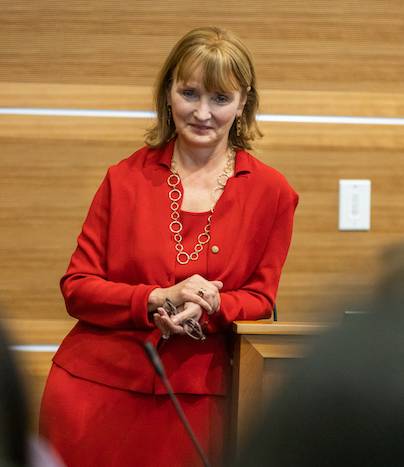 Harwell talked to students on March 2, 2020, about women in politics, her experience
running for office and what it was like leading and managing the House of Representatives
from 2011 to 2018. She also shared in a frank discussion how she pushed the House
to adopt a more rigorous process to root out sexual harassment after a series of complaints
against a lawmaker. Harwell was a state representative for 30 years.
Harwell talked to students on March 2, 2020, about women in politics, her experience
running for office and what it was like leading and managing the House of Representatives
from 2011 to 2018. She also shared in a frank discussion how she pushed the House
to adopt a more rigorous process to root out sexual harassment after a series of complaints
against a lawmaker. Harwell was a state representative for 30 years.
Racial Justice Protests and the First Amendment: Amid the summer and fall of protests against police brutality, a Zoom panel including a scholar in African American history, a front-line journalist in Portland and a First Amendment expert shared perspective with students on Sept. 16, 2020, during Constitution Week.
The panelists included: Ashley Howard, an assistant professor of African-American
history at the University of Iowa whose book manuscript analyzed the 1960s rebellions
in the Midwest; 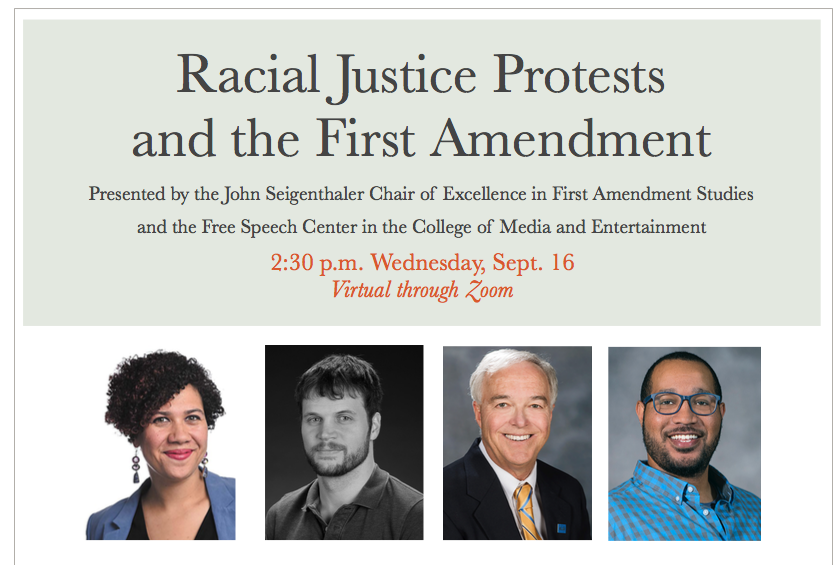 Ryan Haas, news editor with Oregon Public Broadcasting who led a team of reporters
in covering the Black Lives Matters protests and law enforcement response in Portland,
Oregon; and Ken Paulson, director of MTSU's Free Speech Center and former dean of
MTSU’s College of Media and Entertainment. Keonte Coleman, an assistant professor
in the school of Journalism and Strategic Media at MTSU was moderator.
Ryan Haas, news editor with Oregon Public Broadcasting who led a team of reporters
in covering the Black Lives Matters protests and law enforcement response in Portland,
Oregon; and Ken Paulson, director of MTSU's Free Speech Center and former dean of
MTSU’s College of Media and Entertainment. Keonte Coleman, an assistant professor
in the school of Journalism and Strategic Media at MTSU was moderator.
2019 events
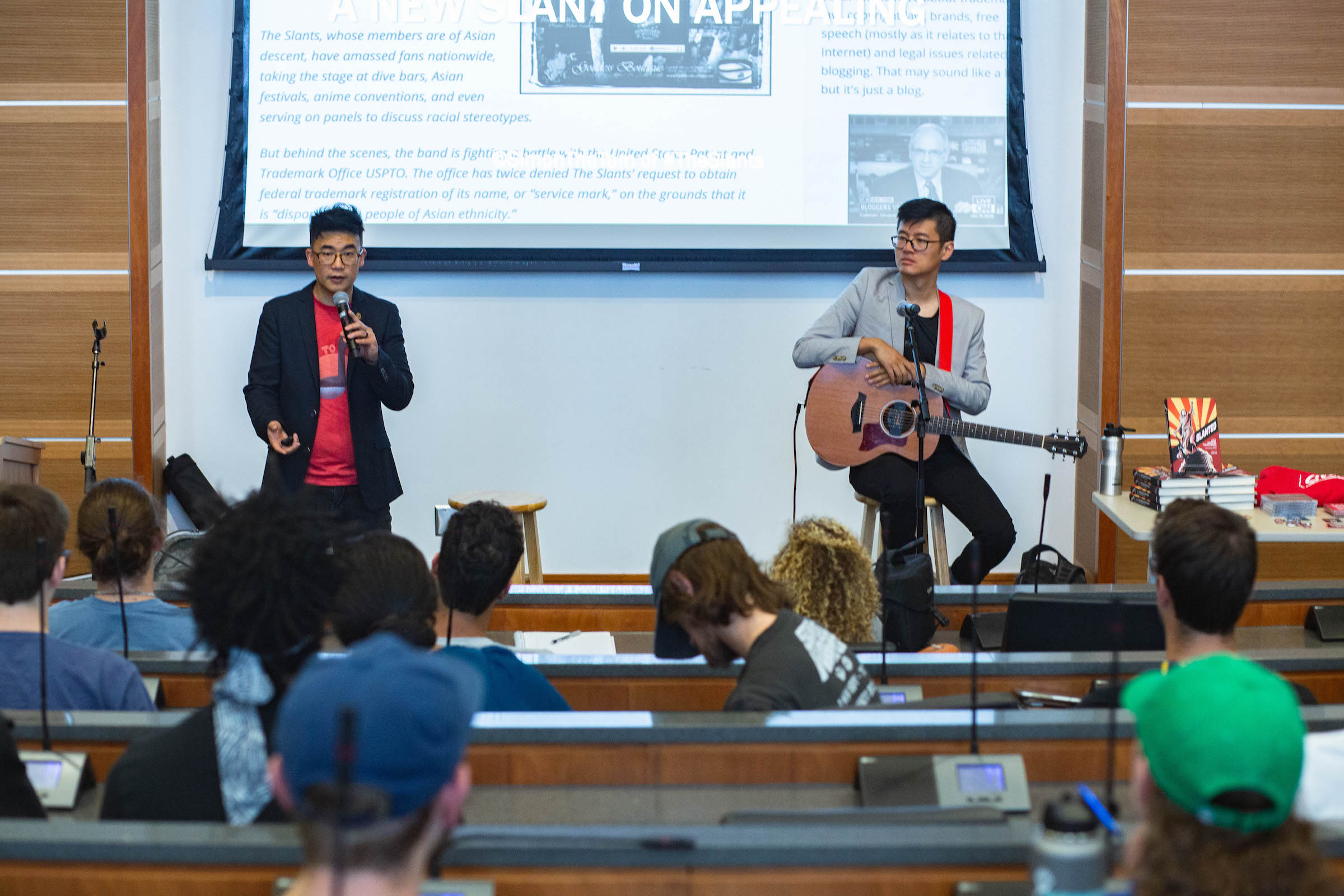
Simon Tam of The Slants: Simon Tam, the founder of Asian-American band The Slants, had no idea when he named his band — as a way to defuse the slur — that one day he would be before the Supreme Court defending it. Tam shared with students his journey and ultimate First Amendment free speech win at the U.S. Supreme Court in Matal v. Tam in 2017. See an interview with Tam while he was on campus. Sept. 24, 2019.
Seigenthaler Report - Uncovering the Police: As the digital age matures, technology that makes government information widely available is triggering a backlash. And the institution most caught in the crosshairs is the local police department. Concerns about victim privacy, officer safety and even the reputations of those arrested have led to a series of decisions and movements to shield information that was once readily available and reported by local news journalists. At the same time, networked communications and heightened concern about terrorist activity have led to an expanding but largely secret use of surveillance techniques, including facial recognition and mobile phone tracking, in ways that allow local police the unprecedented ability to know who is where and when.
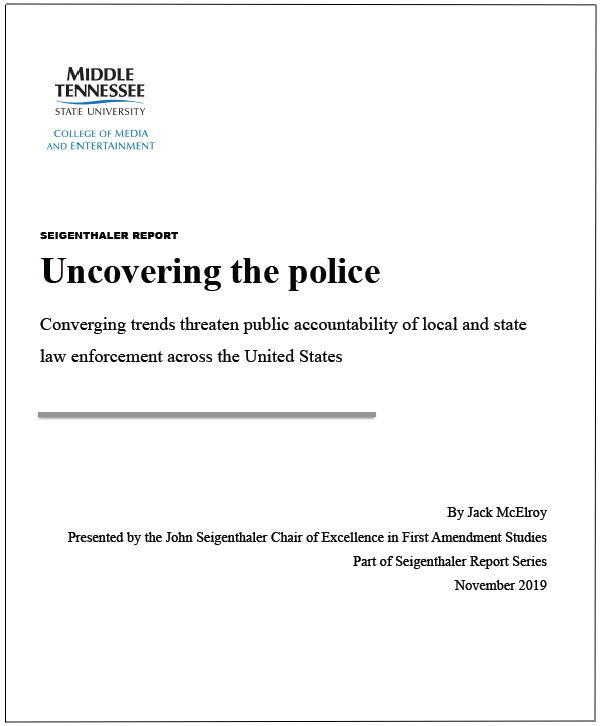 These trends raise important questions about the ability of the press to independently
report on crime and law enforcement activities in their communities. Longtime journalist
and former Knoxville News Sentinel Editor Jack McElroy documents the distinct forms
of this new “curtain of confidentiality” and poses important questions for journalists
and communities alike in Uncovering the Police: Converging trends threaten public accountability of local and
state law enforcement across the United States. McElroy engaged journalism students in discussion in several classroom visits and
in an event open to the entire campus. The Seigenthaler Reports is a series of white
papers exploring current issues in journalism, with particular focus on press freedom,
the capacity of the press to adequately inform the public, and the changing nature
of the press in a digital age. Nov. 4-5, 2019.
These trends raise important questions about the ability of the press to independently
report on crime and law enforcement activities in their communities. Longtime journalist
and former Knoxville News Sentinel Editor Jack McElroy documents the distinct forms
of this new “curtain of confidentiality” and poses important questions for journalists
and communities alike in Uncovering the Police: Converging trends threaten public accountability of local and
state law enforcement across the United States. McElroy engaged journalism students in discussion in several classroom visits and
in an event open to the entire campus. The Seigenthaler Reports is a series of white
papers exploring current issues in journalism, with particular focus on press freedom,
the capacity of the press to adequately inform the public, and the changing nature
of the press in a digital age. Nov. 4-5, 2019.
The press and the Parkland high school shooting.
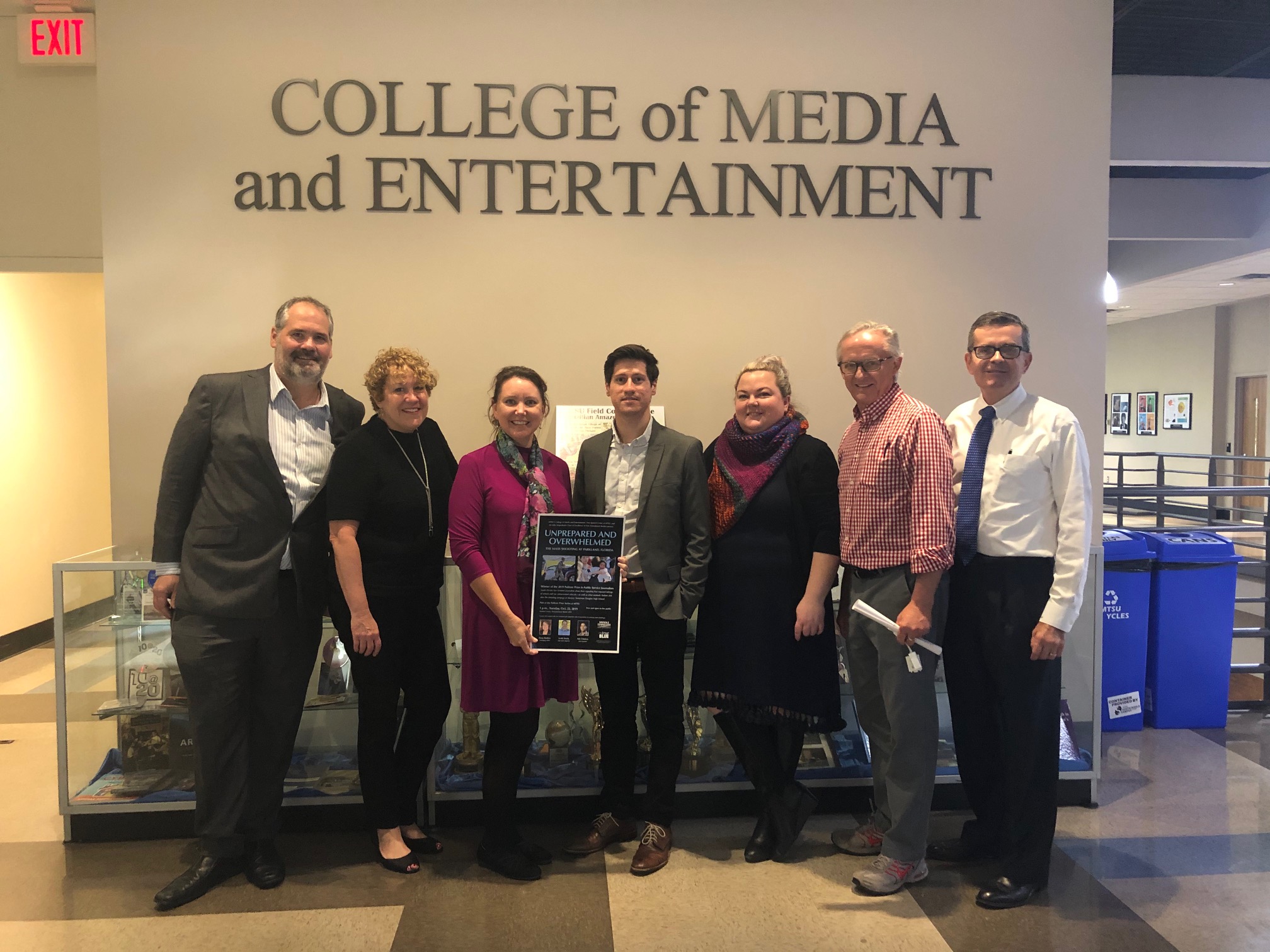
Journalists from the South Florida Sun Sentinel who won the 2019 Pulitzer Prize in Public Service for their reporting about the deadly shooting rampage at Marjory Stoneman Douglas High School presented several programs to students, engaging them in discussion about the ethical decisions and role of the press in reporting what happened. The Sun Sentinel's coverage won the Pulitzer Prize for its stories that exposed failings and missteps by school and law enforcement leading up to the shooting as well as the response to the shooter on campus. Managing editor Dana Banker, data reporter Aric Chokey and eduction reporter Scott Travis gave classroom presentations about their work as well as presented a program open to the entire campus. Oct. 21-22, 2019.
2018 events
The Wall. Journalist who won the 2018 Pulitzer Prize for Explanatory Reporting talked about their digital storytelling project that explored the difficulties and unintended consequences of constructing a wall along the U.S. border with Mexico. The program included reporter Laura Gomez who traveled the entire 2,000-mile border, project manager Annette Meade and Mitchell Thorson, interactive graphics editor. Oct. 3, 2018
War and Its Costs. C.J. Chivers, a former Marine and winner of the 2017 Pulitzer Prize in Feature Writing, discussed his work covering the front lines in Afghanistan and the veterans of the war on terror after they returned home. Feb. 6, 2018.
2017 events
Future of Journalism Education Roundtable.
News media industry and academia leaders gathered for a daylong roundtable on the the state of journalism schools, trends, needs and positioning for a new generation on Oct. 23, 2017.
Read the report / Download a PDF.
The roundtable included presentations by Stephens College President Dianne Lynch on her research project "Above and Beyond: Looking at the Future of Journalism Education," and Allan Richards, associate professor of journalism at Florida International University, on the "JMC Innovation Project."
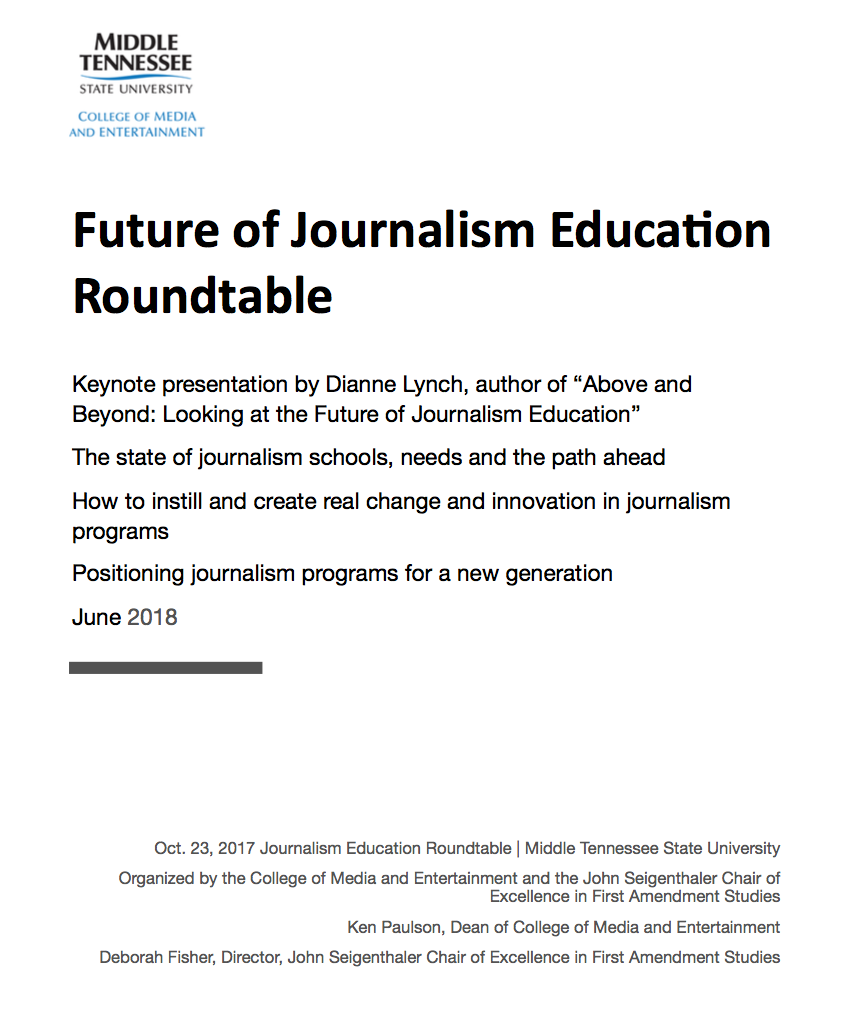
Other guests included Bill Church, senior vice president of news for GateHouse Media; Martin Keiser, senior fellow with Democracy Fund; Eric Ludgood, assistant news director, Fox 5 News, Atlanta; Greg Luft, professor and chair of the Journalism and Media Communications Department, Colorado State University; Ronald Roberts, CEO and managing partner of DVL Seigenthaler; Tracey Rogers, vice president and general manager of WKRN, Nashville; and Thom Storey, Chair of Media Studies Department at Belomont University. For a full list of participants, see the report.
We captured the four segments of the roundtable on video.
The Opioid Crisis: Follow the Pills. Eric Eyre, winner of the 2017 Pulitzer Prize for Investigative Reporting, and Patrick McGinley, an attorney who worked with Eyre, discussed their fight to open court records that exposed the role of major drug distributors in West Virginia in the opioid crisis. (Part of Pulitzer Prize series). Sept. 28, 2017.
A fact-checker’s tales from the 2016 election. Bill Adair, founder of PolitiFact. (Part of Pulitzer Prize series). Feb. 2, 2017.
2016 events
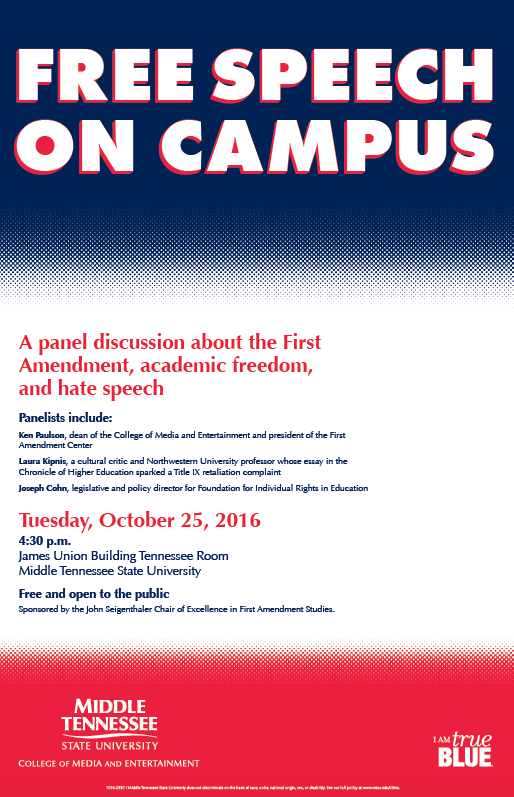
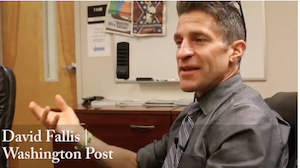 Fatal Force. David Fallis, deputy investigative editor of The Washington Post, discusses the news
organization’s year-long study of police shootings in the United States and its unprecedented online database documenting all incidents. The project won
a 2016 Pulitzer Prize in National Reporting. (Part of Pulitzer Prize series). Sept.
20, 2016
Fatal Force. David Fallis, deputy investigative editor of The Washington Post, discusses the news
organization’s year-long study of police shootings in the United States and its unprecedented online database documenting all incidents. The project won
a 2016 Pulitzer Prize in National Reporting. (Part of Pulitzer Prize series). Sept.
20, 2016
Free Speech on Campus, a panel discussion focusing free speech, academic freedom and hate speech, featuring Laura Kipnis, a cultural critic and Northwestern University communications professor whose essay in The Chronicle of Education prompted a Title IX investigation; Joe Cohn, legislative and policy director for Foundation for Individual Rights in Education, and Ken Paulson, dean of the College of Media and Entertainment, and president of the First Amendment Center. Oct. 25, 2016.
Diane Nash, Civil rights legend speaks to MTSU students on Constitution Day (co-sponsor). Sept. 14, 2016.
2015 events
From the Front Lines of Ferguson: Covering the New Civil Rights Movement. St. Louis Post-Dispatch Pulitzer Prize-winning photographer David Carson, St. Louis alderman and activist Antonio French, and USA TODAY national reporter Yamiche Alcindor.

Josh Williams, multimedia editor of The New York Times, speaks. (co-sponsor)
Don’t Sell Your Friends: How Social Media Became Social Programming. Douglas Rushkoff, media theorist, speaks on: (co-sponsor)
Sharyl Attkisson. Award-winning former CBS and CNN investigative journalist speaks on topics such as governmental intimidation of journalists, and network news’ increasing reliance on pop culture “reporting.” (co-sponsor)
No Voice, No Choice - The Voting Rights Act at 50. Civil Rights Movement icons Revs. James Lawson and C.T. Vivian, as part of Constitution Day (co-sponsor)
First Amendment and Beyond: An Editorial Cartoonist’s Life. Cartoonist Daryl Cagle (co-sponsor)
2012
Leonard Pitts Jr. Pulitzer Prize-winning columnist, speaks on “It’s Time to Face Facts.”
Sebastian Junger. Author of War and the Perfect Storm, speaks on “Dispatches from War: Stories from the Front Lines of History.”
Global Politics in the Post-Obama Era. Featuring international human rights lawyer and media commentator Arsalan T. Iftikhar as speaker.
2011
Living the First Amendment. Lecture with John Seigenthaler and son John M. Seigenthaler.
Uncovering Corruption: Tracking the Special Interest Money that is Making Washington Ungovernable. Sandy Johnson, managing editor of the Center for Public Integrity.
2010
Earl Graves Sr. Founder and publisher of Black Enterprise magazine, speaks.
George Curry. Journalist with Sports Illustrated, St. Louis Post-Dispatch.
From Crime Lab to Crime Fiction. Dr. Kathy Reichs, producer of the Fox TV series “Bones”.
Gloria Steinem. Feminist, political activist, journalist and co-founder of Ms. magazine.
Chuck Klosterman. Pop culture critic and author.
Establishing Justice: The New Supreme Court. Award-winning National Public Radio legal affairs correspondent Nina Totenberg,
2009
We’re Someplace We’ve Never Been: Race, Diversity and the New America. Eugene Robinson, columnist and TV commentator.
Free Speech on University Campuses: The State of Play. Gene Policinski of the First Amendment Center and Nashville Scene columnist and Vanderbilt professor Bruce Barry, with a performance by the First Amendment Center’s Freedom Sings multimedia program. (Part of Constitution Day events)
The Internet and the First Amendment. Robert Cox, president of the Media Bloggers Association.
Panel on First Amendment Freedoms. John Seigenthaler, Richard Land of the Southern Baptist Convention, and former NAACP executive Elaine Jones.
Torture and Truth: America, Abu Gharaib and the War on Terror. Investigative reporter Mark Danner discusses his new book.
Civil Liberties: Surveillance and Terrorism. Author and editor Roger Newman.
Body Image and the Media. Documentary filmmaker Jesse Epstein.
2008
Race, the Media, and Presidential Politics: The Truth about the Fact. USA Today columnist DeWayne Wickham.
Women, Media and the Presidential Election. Carol Swain (Vanderbilt Law), Rita Henley Jensen (Women’s eNews editor and founder) and author Maurine Beasley.
Wikipedia. John Seigenthaler, Wikipedia founder Jimmy Wales and others debate the reliability, credibility and erroneous information on Wikipedia’s Seigenthaler biographical entry.
The Media and Hillary Clinton. The New Yorker editor Susan Morrison.
Underreported and Overexposed: People of Color in the Media. CNN anchor Fredricka Whitfield.
History in the Making: Press Coverage of the Presidential Campaign. John Seigenthaler, Bill Kovach, John Mashek and Pulitzer Prize-winning Associated Press journalist Walter Mears.
One on One with Candy Crowley. CNN chief political correspondent.
2007
Terry Gross. Co-executive producer and host of NPR’s Fresh Air, lectures.
Media Ethics Summit Conference (co-sponsor).
Study in Free Expression Theory (co-sponsor).
Will Work Leave You Speechless? Vanderbilt professor-author Bruce Barry.
2006
Vice President Al Gore.
Covering the Front Lines: The Evolution of War Journalism and the Lasting Effects of War Coverage in Journalism. David Halberstam, author and former Pulitzer Prize-winning war correspondent for The New York Times.
Self-Inflicted Wounds — Journalism’s Lost Credibility. Al Gore, John Seigenthaler, Pulitzer Prize-winning The Washington Post reporter Carl Bernstein, USA Today executive editor John Hillkirk, and The New York Times Jonathan Landman.
Women and Media: Are Women’s Voices Heard in Mainstream Journalism? TV news correspondent Lynn Sherr of “20/20”.
2004
Rhythm & Blues in Black & White: A Discussion of Race and Music. A panel in conjunction with the Country Music Hall of Fame and Museum’s exhibit Night Train to Nashville: Music City Rhythm & Blues, 1945-1970.
When War is Reduced to a Photograph. Barbie Zelizer, professor at the University of Pennsylvania.
2003
Embedding Journalists with a Military Fighting Force. Eric Ludgood, CNN vie president of international programming.
The Media and the Emotions of War. Columbia University professor and author Todd Gitlin.
The Rise and Fall of the Marketplace of Ideas. Communications scholar John Durham Peters of the University of Iowa.
Shaking the Foundation: Investigative Journalism and the Death Penalty. Pulitzer Prize-winning journalist Ken Armstrong.
News Media and Cultural Diversity: Challenges and Best Practices. Panel that includes El Paso Times editor Don Flores and Seattle Post-Intelligencer editor Kenneth Bunting.
2002
Former Vice President Al Gore. A year-long lecture series on “Media and Democracy.”
Race in the New Century: A View from the Newsroom. Panel with Pulitzer Prize-winning Philadelphia Inquirer columnist Acel Moore.
Herman S. Gray. Author of “Watching race: Television and the Sign of Blackness.”
Post Sept. 11 Journalism. Baltimore Sun editor William K. Marimow, a two-time Pulitzer Prize winner.
A Word on Words. 30th anniversary of taping, with two shows dedicated to First Amendment issues. Participants include author David Halberstam, Bill Kovach, and authors Winston Groom (Forrest Gump) and Alice Randall (A Wind Done Gone).
Journalism After 9-11. Panel with former New York Times writer Anthony Lewis, columnist and scholar Geneva Overholser, University of London professor Philip Drummond, and Shaker Elsayed, secretary general of the Muslim American Society.
Creative Freedom and Producing Music Outside the Recording Industry’s Big Business Mainstream. Ian MacKaye, founder of independent record label Dischord and singer-guitarist for punk band Fugazi.
Jim Newton, deputy metro editor for politics and government at the Los Angeles Times, speaks.
2001
National Security Versus Civil Liberties. Panelists include John Seigenthaler, state ACLU director Hedy Weinberg, and Pulitzer Prize-winning and former NBC News president Michael Gartner.
1999
Tom Wicker. The New York Times columnist.
1998
James Tobin. Biographer of war correspondent Ernie Pyle and the Wright brothers.
Can They Really Say That? Popular Music and the First Amendment. Nina Crowley, executive director of the Massachusetts Music Industry Coalition.
1996
Journalism Education, the First Amendment Imperative, and the Changing Media Marketplace. Speakers include journalism professor and scholar James Carey and media critic, writer and professor Jay Rosen of New York University.
1995
Hodding Carter III. Former newspaper publisher.
1993
The Old News, the New News and the First Amendment. Former Chicago Tribune editor Jim Squires, Dan Hallin of the University of California, and Richard Campbell of the University of Michigan.
A View from Washington. Nationally syndicated columns Carl Rowan.
1991
Tom Wicker. The New York Times columnist
1988
Political Cartooning and the First Amendment seminar and exhibit. Guest speakers include Sandy Campbell (The Tennessean), David Horsey (Seattle Post-Intellegencer), Etta Hulme (Fort Worth Star-Telegram), Sam Rawls (United Features) and Draper Hill (The Detroit News).
1987
Symposium on the Fairness Doctrine. Guest panelists Wendell “Sonny” Rawls, Fred Graham, Jim Squires, Jerome Barron, and Rep. Jim Bates.
Symposium on the Red Scare. Pulitzer Prize-winning author Studs Terkel is among the speakers.
